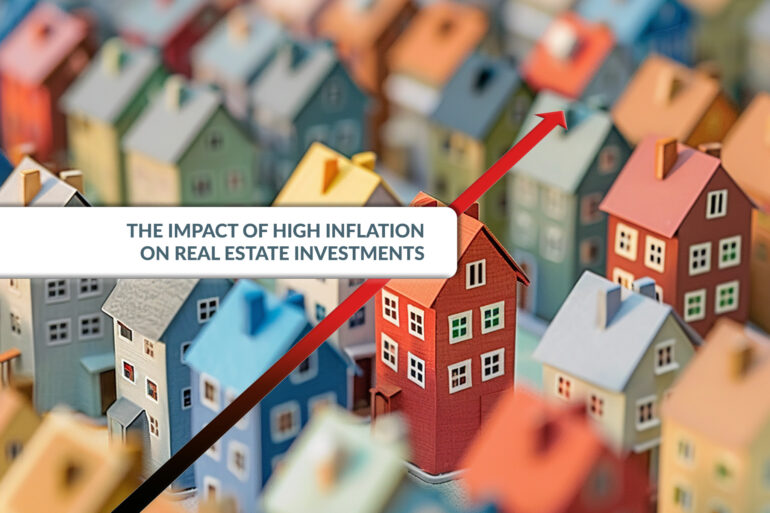The Impact of High Inflation on Real Estate Investments
As an investor, staying informed about the economic indicators that can affect your investments is essential. An important one is inflation, which has been making headlines in recent months. Despite some fluctuations, key inflation indicators remain high. In fact, this could have significant implications for real estate investors.
We’ll delve into the reasons behind the high inflation rates, how it affects the real estate market, and what investors can do to navigate this challenging economic landscape. Whether you’re a seasoned investor or just starting, understanding the impact of inflation on the real estate market is crucial for making informed investment decisions.
High inflation can harm the economy, leading to reduced consumer purchasing power and lower savings and investment returns, which makes long-term planning more difficult.
So, keep reading to learn more about this critical economic indicator and how it could affect your real estate investments.
What Is Inflation?
According to Investopedia, inflation refers to the general increase in the price level of goods and services over time. Inflation means that each unit of currency, such as dollars or euros, can buy fewer goods or services than before. In other words, inflation reduces the purchasing power of money. Inflation can be caused by a variety of factors, such as:
- Increase in the supply of money in circulation.
- Higher demand for goods and services.
- Decrease in goods and services supply.
High inflation can harm the economy, leading to reduced consumer purchasing power and lower savings and investment returns, which makes long-term planning more difficult.
Understanding the Key Inflation Indicators
Inflation can have a significant impact on the economy and investors’ portfolios. Therefore, one must understand the various inflation indicators used to track changes in the economy. Below, we’ll explain the various key inflation indicators and their importance for investors.
Home prices
Rising home prices are a key inflation indicator for real estate investments because they can impact the profitability of real estate investments. As inflation increases, the cost of goods and services, including housing, tends to rise. This increases home prices, making it more expensive for buyers to purchase a home.
As a result, the demand for homes may decrease, potentially impacting real estate investors who rely on rental income or plan to sell their properties. On the other hand, rising home prices may also present opportunities for real estate investors to purchase properties at a lower price and potentially sell for a profit later on.
Therefore, real estate investors should stay informed about home price trends and adjust their investment strategies accordingly to minimize risks and take advantage of opportunities. To gain further understanding, we recommend exploring our education section on Property Onion, which delves into the impact of inflation on housing prices.
As an inflation indicator, housing starts can provide insight into the supply and demand dynamics of the real estate market.
Housing starts
Housing starts refer to the number of new residential construction projects that have begun during a particular period. This indicator gauges the health of the real estate market and the broader economy. It reflects the demand for new housing and the investment level in the construction industry.
As an inflation indicator, housing starts can provide insight into the supply and demand dynamics of the real estate market. When the number of housing starts is increasing, it suggests that demand for housing is rising and that developers are responding by increasing the supply of new homes. This can lead to upward pressure on prices, as the increased supply may fail to meet the growing demand.
Conversely, when the number of housing starts is declining, it suggests that demand for housing is weakening, and developers are responding by reducing the supply of new homes. This can lead to downward pressure on prices, as the reduced supply may exceed the reduced demand.
Construction costs
Rising construction costs affect the overall cost of building or renovating a property. This can lead to higher prices for homes, and may also result in higher rents to cover the increased costs.
Construction costs can rise due to various factors, such as increases in the cost of labor, materials, and regulatory requirements. Inflationary pressures can also increase the cost of borrowing, which can further increase the cost of construction.
Rising mortgage rates can also impact the value of existing real estate assets, as the cost of financing these assets increases.
Mortgage rates
Rising mortgage rates have a significant impact on the cost of borrowing for real estate purchases. As inflation increases, interest rates tend to rise, including mortgage rates. This means that it will cost more for individuals to borrow money to purchase a property, which can lead to a decrease in demand for real estate investments.
Furthermore, rising mortgage rates can also impact the overall cost of owning a property. As the cost of borrowing increases, the cost of monthly mortgage payments also increases. This can lead to decreases in disposable income, which can impact consumer spending and overall economic growth.
Real estate investors should pay close attention to mortgage rates as they can impact both demand and affordability for real estate investments. Rising mortgage rates can also impact the value of existing real estate assets, as the cost of financing these assets increases. For deeper insights, visit our educational section on Property Onion where you can find Mortgage Rate Predictions for 2023.
Rental prices
Rental prices reflect changes in supply and demand for rental properties. As demand for rental units increases, landlords may raise rents to take advantage of the higher demand. This increase in rental prices can cause inflation in the rental market, which can lead to higher costs for renters and impact the overall inflation rate of an economy.
For real estate investors, rising rental prices can be a positive indicator of potential profits. As rents increase, investors may see higher returns on their rental properties, and the property value may also appreciate. However, if rental prices rise too quickly, it can lead to affordability issues for renters and potential market instability.
Reasons for High Inflation Rates
High inflation rates in real estate can be caused by various factors. Here are some of the most common reasons:
- High demand: When there is a high demand for real estate, the prices rise due to the limited supply. This can be caused by population growth, immigration, and urbanization.
- Low-interest rates: When interest rates are low, people are more likely to take out mortgages to purchase real estate. This increases demand and drives up prices.
- Speculation: Speculators may buy up properties with the hope of selling them later for a profit. This can lead to a bubble in real estate prices that eventually burst, causing a sharp drop in values.
- Government policies: Government policies can influence the supply and demand of real estate. For example, zoning regulations, rent control, and subsidies can affect the supply of rental units and the cost of owning property.
- Economic growth: A growing economy can lead to higher inflation rates in real estate. This can happen when people have more disposable income and can buy more real estate.
- Construction costs: The cost of manufacturing new homes and buildings can affect the price of real estate. When construction costs increase, the price of new homes and buildings also rises, leading to higher inflation rates in real estate.
- Land availability: When land is scarce, the price of real estate goes up. This can happen in areas with limited space for development, such as cities or areas with strict environmental regulations.
Overall, various factors can contribute to high inflation rates in real estate, so keep an eye on them to understand how they might affect the real estate market in the future.
Real estate investors face unique challenges in high-inflation environments.
Impact of High Inflation Rates on Real Estate Investments
High inflation rates can have a significant impact on real estate investments. Here are some ways they might:
- Decreased purchasing power: High inflation rates can decrease the purchasing power of real estate investors as the cost of goods and services increases. This means that investors may not be able to afford the same level of investment as they could before the inflationary period.
- Increased interest rates: Inflationary periods can lead to increased interest rates, making it more expensive for investors to borrow money for real estate investments. This can decrease the demand for real estate investments and lower property values.
- Rent increases: High inflation rates can lead to increases in rent prices, as landlords seek to keep up with the rising costs of goods and services. This can be beneficial for real estate investors who own rental properties, as they can increase their rental income.
- Lower occupancy rates: Inflationary periods can lead to lower occupancy rates, as renters cannot afford higher rent prices. This can decrease the rental income for real estate investors and make it harder to fill vacancies.
- Increased operating costs: High inflation rates can lead to increased operating costs for real estate investors, as the cost of materials, labor, and utilities increase. This can decrease the profitability of real estate investments.
- Changes in demand: High inflation rates can lead to changes in demand for different types of real estate investments. For example, investors may prefer to invest in commercial properties instead of residential properties, as businesses may be better equipped to handle the increased costs associated with inflation.
With the right approach, smart investors can turn the challenges of high inflation into opportunities for growth and success.
Strategies for Real Estate Investors to Navigate High Inflation
Real estate investors face unique challenges in high-inflation environments. However, there are several strategies that real estate investors can employ to navigate high inflation:
- Invest in assets that appreciate inflation: Real estate is generally considered a hedge against inflation because property values tend to rise with inflation. Investors can consider investing in properties that have historically appreciated during inflationary periods, such as multi-family or commercial properties.
- Use fixed-rate financing: Inflation can cause interest rates to rise, making borrowing more expensive. With fixed-rate financing, investors can lock in a lower interest rate and protect themselves against rising rates.
- Consider inflation-adjusted leases: For rental properties, investors can consider using inflation-adjusted leases that include rent increases tied to the Consumer Price Index (CPI) or other inflation measures. This can help ensure that rental income keeps pace with inflation.
- Diversify investments: Investing in different types of properties and different geographic regions can help spread risk and reduce exposure to inflation in any one market.
- Utilize tax benefits: Real estate investors can take advantage of tax benefits, such as depreciation, which can help reduce taxable income and increase cash flow.
- Monitor market conditions: Investors should stay informed about economic conditions and inflationary trends in their local and national markets. This can help them make informed decisions about buying, selling, or holding onto properties.
- Have a long-term investment strategy: Real estate investing is a long-term game. Investors who have a solid long-term strategy and plan for the ups and downs of the market are more likely to weather inflationary periods successfully.
Inflation-Proofing Your Real Estate Investments
In conclusion, high inflation can have a significant impact on real estate investment, affecting property values, rental income, and overall profitability. However, smart investors can still thrive in these conditions by carefully considering location, property type, and financing options.
By staying informed and adaptable, real estate investors can weather the storm of high inflation and come out ahead in the long run. With the right approach, smart investors can turn the challenges of high inflation into opportunities for growth and success. So, don’t let high inflation scare you away from real estate investment, instead use it as an opportunity to make informed and strategic decisions.
Sign up for our premium subscription on Property Onion to receive a personalized approach to real estate investing, unlock exclusive perks, and witness a significant surge in your investments.








